It's never boring living over the store in LI's downtowns
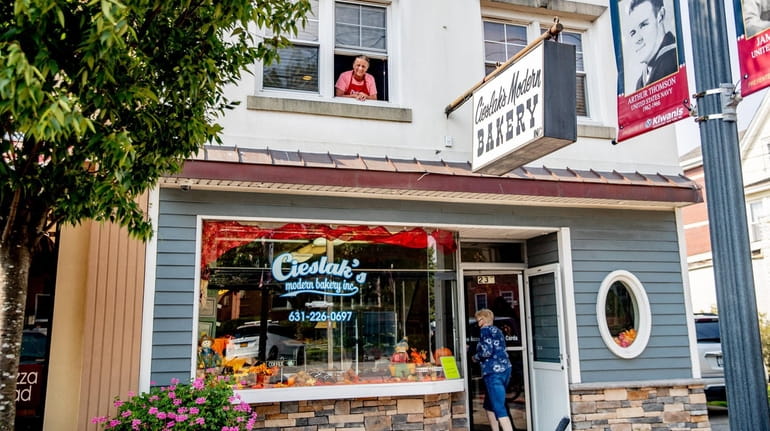
Eileen Biggs, the third generation of her family to own Cieslak's Modern Bakery in Lindenhurst, in the apartment over the bakery where her mother, aunt and cousins once lived. Today, Biggs' grandchildren play in its living room. Credit: Raychel Brightman
Earlier this year, Monica Borja of Freeport faced a housing dilemma. The lease was ending on the Freeport home she’d been renting near the Nautical Mile while she was house hunting on Long Island. Borja already owned a home in Pennsylvania’s Poconos, where she’d lived before moving to Long Island, but she and her boyfriend wanted to stay in Freeport to be near his mother.
"I didn’t want to take care of two houses," says Borja, 48, a finance manager for a Long Island car dealership. They decided to go apartment-hunting instead.
The solution? A one-bedroom apartment Coach Realtors broker Mary Kennedy found for them on the Nautical Mile above a Greek restaurant and gift shop. In April the couple moved into the apartment, which features a cathedral ceiling, an open-floor concept living room, kitchen and dinette, a "huge" bedroom and a waterfront deck, Borja says.
"It’s a great location for anyone looking for excitement, nightlife and restaurants," Kennedy says.
Living amid the legendary boulevard’s bars, restaurants and seafood markets appeals to Borja, who likes to walk to the nearby Halfway Down bar/restaurant to sip the occasional Grey Goose. "Believe it or not, it’s very quiet," says Borja, who gets up at 7 a.m. daily to jog to a local marina or do yoga on the deck. The club music ends at 11 p.m., "so it’s not noisy" at bedtime either, she adds. The only drawback is the heavy traffic on Woodcleft Avenue, the Nautical Mile’s street that dead ends at the waterfront.
"You have that ambience of being in a downtown social scene," Borja says, "yet at the same time you have the quietness and Zen-ness of being on the water."
Everything nearby
A shop-top roost may not be the first thing Long Islanders think of in terms of suburban living, but it has its virtues — such as a short walk to the drugstore, the grocer and public transportation, say former and current occupants. And it’s a time-honored tradition for merchants who’ve lived above their own shops.
"You wake up, take a shower and come to work. You don’t have to travel or try to find a parking space," says Ayhan Hassan, 69, who lived briefly in an apartment he now rents out over his restaurant in Port Washington, Ayhan’s Shish Kebab Mediterranean Grill.
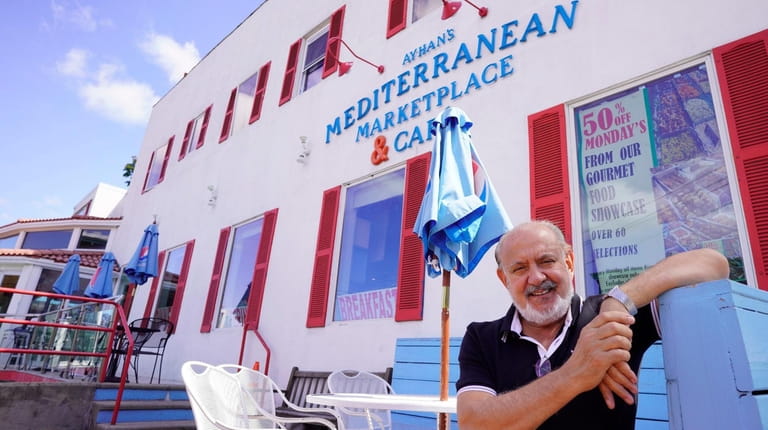
Restaurateur Ayhan Hassan rents out apartments over his Mediterranean Marketplace & Café in Port Washington and briefly lived in an apartment above the restaurant he owns across the street. His tenants enjoy a "bohemian" lifestyle, he says. Credit: Chris Ware
Hassan, who also rents out apartments over his Mediterranean Marketplace & Café across the street from the restaurant, says his tenants enjoy a view of Main Street and a "bohemian" lifestyle. Coffee shops, stores, parks, the town dock and a library all lie within easy walking distance of home.
A vibrant downtown also awaits future tenants of apartments going up over the first-floor offices of Jovia Financial Credit Union in Huntington village. Five one-bedroom and four two-bedroom apartments will be spread across the existing 4,000-square-foot second floor, which is being converted from office space, and a new 4,000-square-foot third floor that is being added to the brick-faced building at New York Avenue and Elm Street.
While Town of Huntington Supervisor Chad Lupinacci noted that the project was approved before the current administration took office and enacted limitations on new development, "Our planning board has done a magnificent job ensuring the building's design aesthetics keep the charm and beauty of the neighborhood intact." With restaurants and theaters in the vicinity, Lupinacci added, "Residents will enjoy world-class food, premier entertainment and cultural amenities just footsteps away."
Deep roots on LI
While living over the shop nowadays puts apartment dwellers close to the good life — and what real estate websites call "walkability" — the setup dates at least to the last century, when immigrant families opened mom-and-pop stores in Long Island downtowns, and needed a convenient place to bed down at night.
Nancy Solomon, executive director of the nonprofit Long Island Traditions in Port Washington, says that in the 1920s, small shops and stores were owned by immigrants who had moved to Great Neck after living in the city. "Great Neck first became popular due to its proximity to the train that could take commuters to the Garment District, where many residents worked, in just 35 minutes," says Solomon, who served as a historic preservation consultant to the Village of Great Neck Plaza. "They found it more affordable and practical to live above the store, saving money to buy a house later on."
Great Neck Plaza was home to The Wychwood, a seven-story luxury apartment building built in 1929 with a restaurant on the ground floor. Residents could order meals from the restaurant to be delivered via dumbwaiter to their apartment, Solomon says. The building is currently a co-op.
In the last century, Patchogue was also home to many such apartments, says Steven Lucas, 74, of Patchogue, treasurer of the Greater Patchogue Historical Society.
Along with Bay Shore and Riverhead, the South Shore village was then a major Suffolk County shopping destination, says Lucas, author of "Patchogue Past and Present," a 2020 book of photographic history. Downtown Patchogue’s Main Street and North and South Ocean avenues were lined with retail stores with second-floor apartments, Lucas says. "A lot of the mom-and-pop store owners and operators either lived in the back or above the store. Many of them were Italian or Jewish immigrants," Lucas says. Among his sources is a 1926 Patchogue telephone directory showing family business and home number listings at the same address.
Lucas says that as families grew and finances improved, many shopkeepers left apartment life behind and bought single-family homes. Beginning in the 1960s, shopping malls and box stores drew away consumers. Nowadays, "most of those structures [with apartments above the shop] are restaurants, and the upper floors have tables in them" for overflow seating in Patchogue’s busy restaurant scene, he says.
Three generations
At Cieslak's Modern Bakery in Lindenhurst, the second-story apartment still exists, says Eileen Biggs, the third generation of her family to own and operate the bakery, founded by her Ukrainian immigrant grandmother, Katherine Cieslak.
Today, the apartment contains the bakery’s office space. And though there’s no tenant, the grandkids play in the living room when Biggs is working downstairs.
"When we were little kids, when our parents were working, we were up there playing," Biggs says.
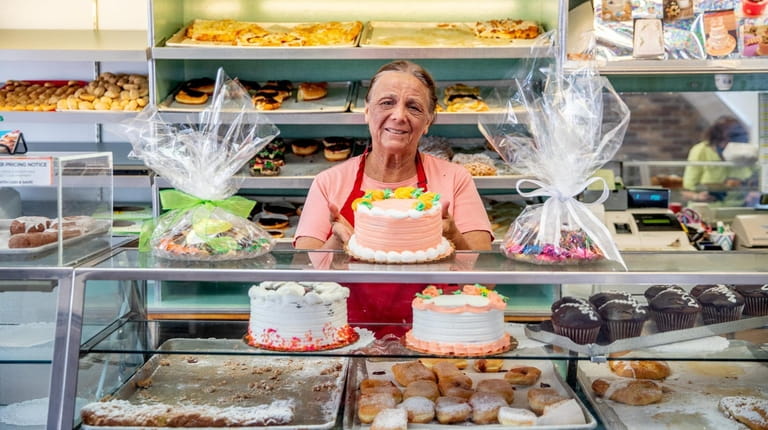
Eileen Biggs has fond memories of spending time as a child in the apartment over her family's bakery in Lindenhurst. Credit: Raychel Brightman
The upstairs apartment with a living room, three bedrooms and kitchen in back of the store was built in 1934 at the same time as the storefront bakery, Biggs says. Her grandparents had been living over another Lindenhurst bakery owned by a family member when they decided to go into business for themselves. Three generations of the family lived in the apartment, including Biggs’ mom, aunt and cousins. Biggs’ mother moved back in 2000 after being widowed and lived there until her death in 2015.
Biggs recalls running downstairs to get warm bread fresh from the oven, and celebrating Christmas and Easter with her cousins.
You can see Wellwood Avenue from the apartment windows. "It’s beautiful lit up at night," Biggs says. "And you can smell the baking downstairs coming through the windows."
Growing up over the shop
When Janet Grunwald performed a concert in Port Washington last month with her classic-rock cover band, "Shindig," she revisited a golden oldie of her own — the building on Main Street where her family lived over their grocery store beginning in the mid-1960s.
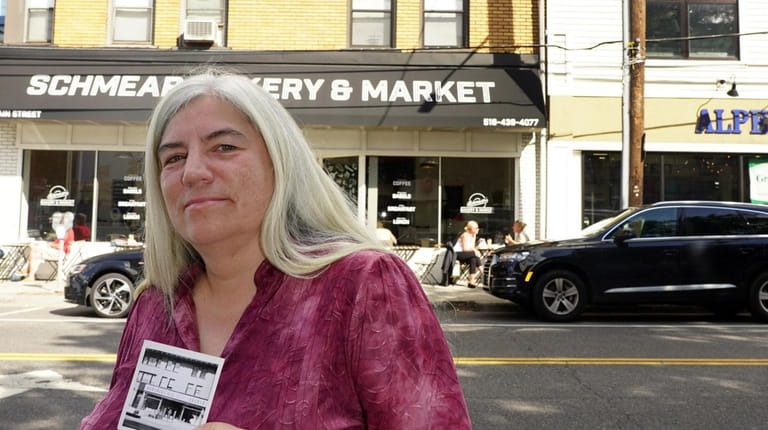
Janet Grunwald holds a photo of her family's grocery store, Brothers All, in front of the spot it occupied on Main Street in Port Washington. She grew up over the shop in the 1960s and '70s. Credit: Debbie Egan-Chin
Brothers All "was the typical local mom-and-pop market," selling produce, dairy, meat and other staples, recalls Grunwald, 57, a high school English teacher living in Leeds, Massachusetts. Living with her family in one of six apartments upstairs, "grocery shopping was a daily drop-in versus a weekly trip," she says. "My bedroom overlooked Main Street, but I never minded the street noise." She could see the holiday lights outside her window in winter. Her father worked downstairs and could give her a ride to school, and the Long Island Rail Road station was across the street for trips to the city.

Leo Grunwald at work at the Brothers All Market in Port Washington in the 1970s. Credit: Grunwald Family
Janet Grunwald’s mother lived in the building until 2003. Today, Schmear Bakery & Market occupies the former grocery space.
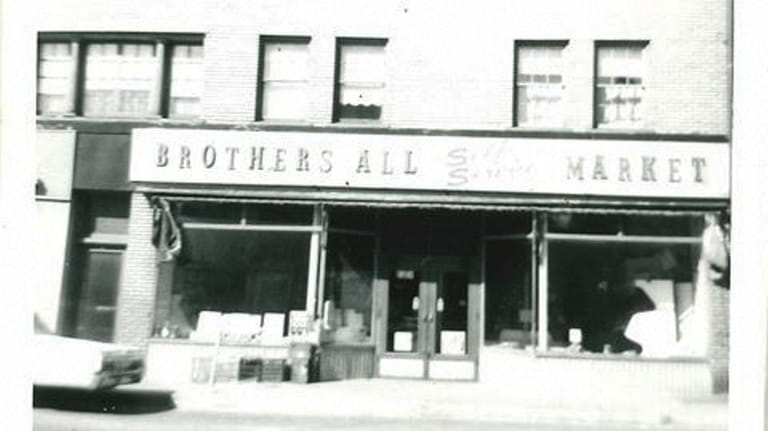
An undated photo of Brothers All Market. Credit: Grunwald Family
Grunwald, who lives in a rural area, says what she misses most about the Main Street apartment is its "proximity to everything I could have needed as a kid and beyond — family, friends, community and commuter access."
